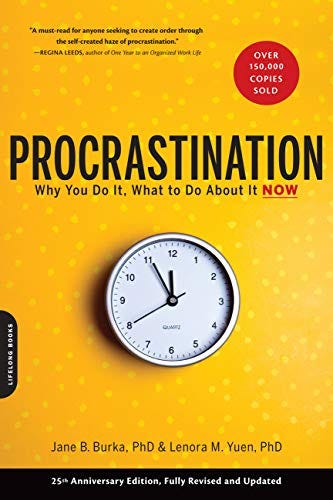Welcome to Citizen Scholar! Since launching seven months ago we’re reaching people all over the world, so we thank you for your support. If you enjoy our writing on civic virtue and individual excellence, we humbly ask you to share Citizen Scholar with your family members and friends who may enjoy it. The contents of the audio and text formats are identical and meant to accommodate your preferences. Please let us know if you have any feedback - we’re always looking for ways to improve!
Introduction
Procrastination is an uncomfortable but important topic. Procrastinators, including some of us at Citizen Scholar, suffer a wide range of consequences. Their behavior can also affect people they care about. Most procrastinators are either unaware of these tendencies or in denial; many who acknowledge their procrastination fall into cycles of shame and self-judgement that don’t lead to improvement. Others despair that this behavior is an immutable part of their personality, meant to be endured rather than overcome.
Fundamentally, the gap between popular thinking about procrastination and the scientific understanding of this phenomenon is surprisingly wide. In Procrastination: Why You Do It, What to Do About it Now, readers benefit from the advice of clinical psychologists who have dedicated their careers to helping procrastinators. In several editions published over the years, Burka & Yuen compiled research as well as observations from their longstanding procrastination therapy practices. The results are truly eye-opening and very helpful to those who would prefer to try a book before therapy to address procrastination.
The Deep Roots of Procrastination
Burka & Yen lay out a number of familiar signs and consequences of procrastination. They also describe the typical cycle that the procrastinator goes through in experiencing them. The following sequence of experiences might sound familiar:
“I’ll start early this time.”
“I’ve got to start soon.”
“What if I don’t start?”
a. ”I should have started sooner.”
b. “I’m doing everything but…”
c. “I can’t enjoy anything.”
d. “I hope no one finds out.”
“There’s still time.”
“There’s something wrong with me.”
The Final Choice: To Do or Not to Do
a. Not to Do
i. “I can’t stand this!”
ii. “Why bother?”
b. To Do – On to the Bitter End
i. “I can’t wait any longer”
ii. “This isn’t so bad. Why didn’t I start sooner?”
iii. “Just get it done!”
“I’ll never procrastinate again!”
The old-school explanation for this cycle would be laziness or another character flaw. Perhaps the most surprising information in the book describes psychologists’ understanding of the root causes that lead people to get stuck in this recurring cycle of procrastination. One of the primary causes is the fear of failure. Many procrastinators are perfectionists who believe their self-worth depends on performance; the fear of poor performance carries such high consequences in their mind that they tend toward avoidance. Burka & Yuen suggest that these people subconsciously seek to avoid testing their best effort against a result; procrastination can be blamed for a bad outcome and the procrastinator’s evaluation of their own competence remains intact. A variety of other mindset characteristics are tied in with this as well, such as a belief that good results should come easily to the competent [worthy] person.
This explanation spoke the most to a procrastinator on our team, but the authors provide several other drivers of procrastination that fall short of a medical issue: the counter-intuitive fear of success, desire to reassert control, desire for autonomy, attempt to stay in a comfort zone, or a subjective sense of time that correlates poorly to objective time. The details of these various root causes form our favorite portion of the book and make it worth picking up. Burka & Yuen also cover the underlying neuroscience, when procrastination may be related to disorders like ADHD, how people become procrastinators and what measures can be taken to remedy their situations.
We were also surprised by the explanations for how people become procrastinators – causes went back to upbringing and mental models of success and failure that people develop. Less surprising but helpful were the techniques recommended by Burka & Yuen. In simple terms, these methods contribute to:
Taking stock of the extent of existing procrastination
Setting and achieving goals in bite size pieces
Improving the individual’s subjective perception of time
Learning to prioritize people and pursuits
Leveraging better physical and mental health
Reducing distractions
Hope for Procrastinators
This book is rich with the many details and tactics that contribute to the above objectives; reading it will be valuable for procrastinators across the severity spectrum. Most of us associate procrastination with being late to appointments and pulling regular all-nighters. More extreme examples in the book include losing careers and marriages. All these people can find in this “Bible” of procrastination explanations for why their behavior is so nominally irrational, as well as steps they can take to improve. Some of us will also be implementing these steps so that we can get back to achieving goals, enjoying leisure time and becoming the people we imagine ourselves to be. Procrastination doesn’t have to remain a badge of irreparable shame but can become a source of self-awareness and improvement.
All the best,
The Citizen Scholar Team
If you made it this far & enjoyed the post, could you please let us know by giving the heart button below a tap? Thank you!














Share this post